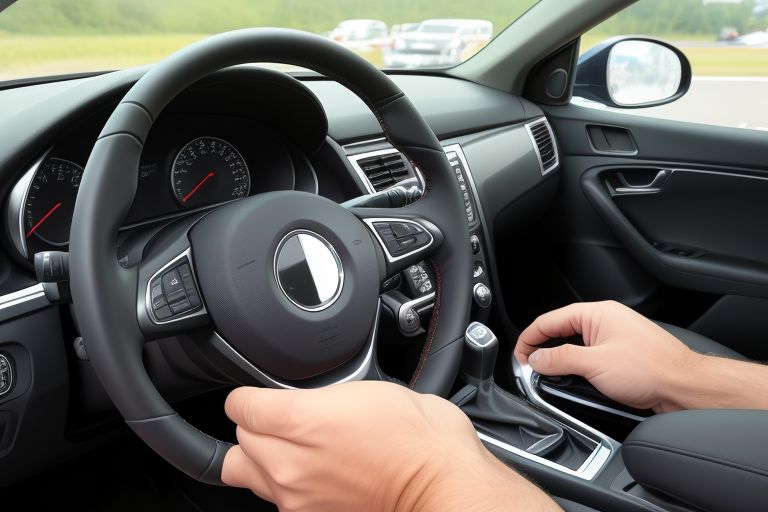If you’ve ever asked, “Why is my steering wheel shaking?” you’re not alone. It’s a common issue that many drivers experience, and it can be caused by several things. Understanding the reasons behind this problem can help you figure out the best way to fix it before it gets worse.
Shaking in your steering wheel can happen at various speeds, often during braking or when driving at higher speeds. It may seem like a minor annoyance, but it’s usually a sign that something in your car needs attention. Whether it’s an issue with your tires, brakes, or suspension, addressing the cause early can save you time, money, and ensure your safety on the road.
Table of Contents
Why Is My Steering Wheel Shaking at High Speeds

When your steering wheel shakes at high speeds, it can be a scary feeling. You might wonder, “Why is my steering wheel shaking?” One common reason for this is unbalanced tires. When your tires aren’t properly balanced, they can cause the steering wheel to shake as the car moves faster. This happens because the uneven weight distribution makes the tires wobble, affecting the stability of the car.
Another reason your steering wheel might shake at high speeds is a problem with your wheel alignment. If your wheels are out of alignment, they will not point in the correct direction. This can cause your car to pull to one side and make the steering wheel vibrate, especially when driving on highways or at faster speeds. Fixing the alignment can often solve this problem and make your driving smoother.
You should also check your tires for signs of wear or damage. Worn-out tires or uneven tread wear can cause vibrations in your steering wheel at higher speeds. Tires need to have enough grip to maintain smooth driving. If your tires are old or damaged, they should be replaced to ensure your safety.
If your car continues to shake despite fixing tire or alignment issues, it could be a deeper problem. You should consult a mechanic who can diagnose the issue. Getting it checked early can save you money and keep your car in good condition.
Why Is My Steering Wheel Shaking When I Brake
Steering wheel shaking when you brake is a common problem, and it’s usually related to your brake system. One of the main reasons for this shaking is warped brake rotors. Brake rotors are the metal discs that your car’s brake pads press against to stop the car. Over time, these rotors can become warped from heat, causing them to wobble when the brakes are applied.
If your steering wheel shakes when you brake, it could also be due to worn-out brake pads. Brake pads wear down with time, and when they are too thin, they don’t make proper contact with the rotors. This can cause the car to shake, especially when you’re slowing down. Replacing your brake pads on time is important for avoiding shaking and ensuring safe stopping.
Another cause of shaking while braking is an issue with your car’s suspension system. If the suspension parts, like shock absorbers or struts, are worn out, they may not absorb bumps and vibrations properly. This can make the shaking worse, especially when braking at higher speeds.
To avoid these issues, it’s essential to get your brake system checked regularly. If your steering wheel shakes when you brake, make sure to have the brake rotors and pads checked and replaced as needed. A professional mechanic will be able to diagnose the exact problem and fix it.
Can Suspension Issues Cause My Steering Wheel to Shake
Yes, suspension problems can cause your steering wheel to shake. The suspension system in your car is responsible for keeping the wheels in contact with the road and helping absorb bumps and vibrations. When the suspension is worn out, it can cause vibrations that affect the steering wheel.
One key part of the suspension system is the shock absorbers. These parts help smooth out the ride by absorbing impacts from the road. When shock absorbers are old or broken, they can’t do their job correctly, and this can lead to shaking, especially when driving on rough roads or during braking.
If your suspension system is the cause of the shaking, you may also notice other signs like uneven tire wear or a rougher ride than usual. It’s important to have your suspension checked if you notice any of these symptoms. The sooner you replace worn-out parts, the safer your car will be to drive.
How to Diagnose Why Your Steering Wheel is Shaking (Easy Guide)
Diagnosing why your steering wheel is shaking might seem difficult, but it’s not impossible. The first step is to check your tires. Inspect them for any visible damage, bulges, or uneven wear. If you notice any of these issues, it’s a good idea to have them rotated or replaced. Balancing your tires might also help eliminate any shaking at high speeds.
Next, check your brake system. If the steering wheel shakes when you brake, the problem could be with your brake rotors or pads. If the rotors are warped, they may need to be replaced. Worn-out brake pads should also be replaced to fix the shaking issue.
Finally, have your wheel alignment checked. If your wheels are not aligned correctly, your steering wheel can shake, especially at higher speeds. A quick trip to a mechanic can help you figure out if your alignment is the issue. Getting this fixed will make your driving experience smoother and safer.
How Wheel Alignment Affects Steering Wheel Shaking

Wheel alignment plays a crucial role in preventing steering wheel shaking. Wheel alignment issues can result in vibrations that affect the steering wheel and uneven tire wear. Misalignment can happen due to factors like hitting a pothole or curb, or just normal wear and tear.
When your wheels are out of alignment, your car may also pull to one side, and your steering wheel might not return to the center easily. This can make driving more difficult and uncomfortable. Getting your alignment checked regularly can help avoid these issues and keep your steering smooth.
If your steering wheel shakes while driving straight or when turning, a wheel alignment may be the solution. A mechanic can adjust your wheel angles to ensure they’re properly aligned, preventing shaking and improving your car’s handling.
Are worn-out brake pads to blame for steering wheel wobble
Yes, when you apply the brakes, worn-out brake pads can cause your steering wheel to shake. When brake pads wear down, they lose their ability to grip the brake rotor properly. This can cause uneven braking, leading to vibrations that you feel in the steering wheel.
It’s important to check the thickness of your brake pads if you notice that your steering wheel shakes when you brake. They should be replaced if they are damaged or thin. Regular maintenance of your brake system will help prevent this problem and ensure your car stops safely without any shaking.
Is It Safe to Drive with a Shaking Steering Wheel

Driving with a shaking steering wheel is not safe. It could indicate serious issues like worn-out brakes, worn-out tires, or suspension issues.Ignoring these problems can lead to accidents or more costly repairs down the road.
If you feel any shaking in your steering wheel, it’s best to take your vehicle to a reputable mechanic for inspection. Repairs and early diagnosis can keep you safe on the road and stop further damage to your vehicle.
This blog post is structured with simple language and focuses on explaining the causes of steering wheel shaking in an easy-to-understand way. Each section addresses a specific problem and offers practical solutions.
Conclusion
In conclusion, a shaking steering wheel is something that shouldn’t be ignored. Whether it’s caused by unbalanced tires, worn-out brake pads, or suspension problems, it’s important to get to the bottom of the issue as soon as possible.Neglecting the issue could result in additional, more costly issues in the future. Checking your brakes and tires on a regular basis, for example, can help keep your steering wheel from shaking.
If you’re not sure what’s causing the shaking, it’s always a good idea to take your car to a mechanic. They can quickly figure out what’s wrong and fix it before it turns into a bigger problem. Staying on top of your car’s health will keep you safe and make driving more comfortable. So, the next time you ask, “Why is my steering wheel shaking?” you’ll know where to start looking!
FAQs
Q: Why does braking cause my steering wheel to shake?
A: It could be due to warped brake rotors or worn-out brake pads. During braking, either can result in steering wheel vibrations.
Q: Can unbalanced tires cause steering wheel shaking?
A: Yes, unbalanced tires can create uneven vibrations, especially at high speeds, leading to a shaking steering wheel.
Q: How do I know if my wheel alignment is causing the shaking?
A: If your car pulls to one side or your steering wheel doesn’t return to the center, misalignment could be the issue.
Is driving while the steering wheel shakes dangerous?
A: Yes, it can be dangerous. It might be a sign of serious issues, like worn-out tires or damaged suspension parts, that need to be fixed.
Q: In order to prevent shaking, how often should I check my brakes?
A: It’s a good idea to check your brakes every 12,000 miles or once a year, whichever comes first, to ensure they are in good condition.




